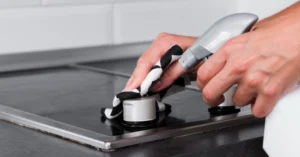A garbage disposal is a kitchen lifesaver, grinding up food scraps to keep your sink clear and your kitchen clean. But when it stops working, it can throw a wrench in your daily routine. Whether your garbage disposal is completely silent, humming but not spinning, or simply not turning on, don’t panic—this comprehensive guide will walk you through the most common issues and their solutions. Drawing from expert insights and user experiences, we’ve crafted a detailed, guide on you’ll fix the issue.
Let’s dive into why your garbage disposal isn’t working and how to fix it, step by step.

Why Your Garbage Disposal Won’t Turn On: Common Causes
- Power Issues: A tripped breaker, blown fuse, or loose plug could be preventing power from reaching the unit.
- Overload Protection: Most disposals have a built-in overload protector that shuts the unit off to prevent motor burnout.
- Jammed Impeller or Flywheel: Food scraps, bones, or foreign objects can jam the grinding mechanism, halting operation.
- Worn-Out Motor: Over tone, the motor can wear out, especially in older units.
- Faulty Wiring or Switch: Damaged wires or a malfunctioning wall switch can disrupt power flow.
- Clogged Drain: A blockage in the drain line can cause the disposal to stop functioning properly.
Step-by-Step Guide to Fix a Garbage Disposal That Won’t Turn On
1. Check the Power Supply
If your garbage disposal is completely silent when you flip the switch, the issue might be with the power supply. Start by ensuring the unit is plugged in securely. If it’s hardwired, check your home’s electrical panel for a tripped circuit breaker or blown fuse. Reset the breaker or replace the fuse if needed.
Next, inspect the wall switch controlling the disposal. A faulty switch can prevent power from reaching the unit. To test this, you can use a non-contact voltage tester to confirm the switch is delivering power. If the switch is defective, you may need to replace it—a task best left to a professional electrician or a freezer repair service expert who can handle appliance wiring.
2. Reset the Garbage Disposal
Most garbage disposals have a red or black reset button on the bottom of the unit. This button is part of the overload protector, which trips to prevent motor damage from overheating or jamming. If your disposal is silent or won’t start, press the reset button firmly. You may hear a click, indicating it’s reset. If the button won’t click or stay in, the motor may still be hot—wait 10-15 minutes and try again.
Pro Tip: If the reset button trips repeatedly, there’s likely an underlying issue like a jam or motor failure that needs addressing.
3. Clear a Jammed Impeller or Flywheel
A common issue is a garbage disposal that hums but doesn’t spin. This humming sound indicates the motor is running, but the impeller or flywheel is stuck, often due to food scraps, bones, or utensils. Here’s how to fix it:
- Turn Off Power: Always unplug the disposal or turn off the circuit breaker to avoid injury.
- Use the Disposal Wrench: Most disposals come with a hex-shaped wrench (often called an Allen wrench). Insert it into the turning hole at the bottom of the unit and rotate it clockwise to free the impeller. You may need to rock it back and forth to dislodge the jam.
- Manual Method: If you don’t have the wrench, use a wooden spoon handle or a similar tool to reach into the disposal through the drain opening. Gently maneuver it to free the stuck impeller. Shine a flashlight inside to check for foreign objects like spoons or bones, and remove them with needle-nose pliers.
Once the jam is cleared, the flywheel should rotate freely. Restore power, press the reset button, and test the disposal with running water.
4. Inspect for Electrical Issues
If the disposal still won’t turn on, there may be an issue with the wiring. Remove the lower cover of the disposal (with power off) and check for burnt or frayed wires. If you spot damaged wires, cut them out and replace them with identical gauge wires, ensuring secure connections. This step requires caution and electrical knowledge—if you’re unsure, contact a professional for garbage disposal repair.
5. Test the Motor
If the above steps don’t work, the motor may be worn out. Garbage disposals typically last 8-12 years, depending on usage and maintenance. A dead motor often requires replacing the entire unit, as motor repairs are rarely cost-effective. To confirm, test the disposal after resetting and clearing jams. If it remains silent and the power supply is intact, the motor is likely the issue.
6. Address Drainage Problems
Sometimes, a clogged drain line can cause the disposal to stop working. If water backs up in the sink, the issue may be a blockage in the drain trap or pipe. Use a plunger to dislodge minor clogs, or remove the drain trap to clear debris. Avoid using chemical drain cleaners, as they can damage the disposal and are often ineffective.
Maintenance Tips to Prevent Garbage Disposal Issues
- Run Cold Water: Always run cold water before, during, and after using the disposal to solidify grease and flush debris.
- Avoid Problem Foods: Don’t put fibrous foods (celery, corn husks), starchy items (potato peels), or hard materials (bones, pits) down the disposal.
- Clean Regularly: Pour a mixture of vinegar and baking soda into the disposal to clean and deodorize it. Ice cubes can help sharpen blades and remove buildup.
- Use It Regularly: Run the disposal weekly to prevent rust and keep the impeller moving freely.
- Check for Leaks: Periodically inspect under the sink for leaks, which can indicate a failing seal or loose connection.
When to Call a Professional for Garbage Disposal Repair in San Francisco
While many garbage disposal issues can be fixed with DIY methods, some problems require professional expertise, especially in a busy city like San Francisco where reliable appliance performance is key. If you’ve tried the above fixes and your disposal still won’t turn on, or if you notice persistent issues like frequent jams, leaks, or unusual noises, it’s time to call in a pro. Here’s when and why to seek professional garbage disposal repair:
- Complex Electrical Issues: Faulty wiring or a malfunctioning switch requires specialized electrical knowledge to avoid safety hazards.
- Persistent Jams: If the impeller jams repeatedly despite clearing debris, the unit may have internal damage or worn-out components.
- Motor Failure: A dead motor often means the disposal needs replacement, and a professional can assess whether repair or replacement is more cost-effective.
- Leaks or Drainage Problems: Leaks from the disposal unit or clogs deep in the plumbing system may require advanced tools and expertise.
Why Choose a Professional in San Francisco?
San Francisco’s unique plumbing systems, often found in older homes, can complicate garbage disposal repairs. A local expert understands these challenges and can provide tailored solutions. Benefits of hiring a professional include:
- Same-Day Service: Many San Francisco repair services offer quick response times to minimize kitchen downtime.
- Expert Diagnosis: Professionals use advanced tools to pinpoint issues like hidden leaks or motor damage.
- Warranty Protection: Reputable services provide warranties on repairs, ensuring long-term reliability.
- Safety Compliance: Licensed technicians follow local codes to ensure safe and compliant repairs.
Frequently Asked Questions (FAQs)
1. Why is my garbage disposal not turning on?
A garbage disposal that won’t turn on may have a power issue, tripped reset button, or jammed impeller. Check the plug, circuit breaker, or reset button first. If those don’t work, the motor may be faulty.
2. How do I fix a garbage disposal that’s humming but not turning?
A humming disposal indicates a jammed impeller. Turn off power, use the hex wrench to rotate the impeller clockwise, or manually dislodge the jam with a wooden spoon handle. Remove any debris with pliers.
3. How do I reset my garbage disposal?
Locate the red or black reset button on the bottom of the unit. Press it firmly until it clicks. If it won’t reset, wait 10-15 minutes for the motor to cool and try again.
4. Can I manually turn a garbage disposal?
Yes, use the hex wrench provided with the disposal to turn the impeller via the hole at the bottom of the unit. Rotate clockwise to free the jam. Alternatively, use a wooden tool through the drain opening.
5. Does hot water damage a garbage disposal?
Hot water can melt grease, causing it to stick to the disposal’s blades and cause clogs. Always use cold water to solidify grease and flush debris effectively.
6. How long does a garbage disposal last?
A well-maintained garbage disposal lasts 8-12 years. Regular use, proper cleaning, and avoiding problem foods can extend its lifespan.
7. Is it safe to put ice in a garbage disposal?
Yes, ice can sharpen blades and remove buildup. Run cold water while grinding ice to flush debris, but avoid overusing ice as it can stress the motor.
8. Can a garbage disposal overheat?
Yes, overuse or jamming can cause the motor to overheat, tripping the reset button. Let it cool for 10-15 minutes before resetting and avoid running it without water.
9. How do I clean my garbage disposal?
Pour a half-cup of baking soda followed by a cup of vinegar into the disposal. Let it fizz for 5 minutes, then flush with hot water. Ice and citrus peels can also freshen it up.
10. What tool do I need to unjam a garbage disposal?
Most disposals come with a hex-shaped wrench (often 1/4 inch). If lost, a compatible Allen wrench or a wooden spoon handle can work to manually turn the impeller.
Conclusion
A garbage disposal that won’t turn on can be frustrating, but most issues—whether a power problem, jam, or tripped reset—are fixable with the right approach. By following the steps outlined above, you can troubleshoot and resolve common problems, saving time and money. Regular maintenance, like running cold water and avoiding problem foods, can prevent future issues and extend your disposal’s lifespan. For complex problems or persistent issues, don’t hesitate to call a professional, especially in San Francisco where local expertise can make all the difference.
For other kitchen appliance issues, such as a malfunctioning freezer, explore our freezer repair services to keep your kitchen running smoothly. If your garbage disposal needs more than a DIY fix, contact our expert garbage disposal repair team for fast, reliable service.






